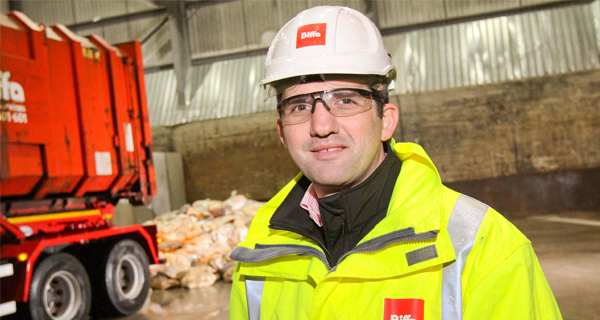
Leading waste services provider, Biffa, is creating a network of strategic food waste transfer stations across the UK, as it continues to lead the market in anaerobic digestion innovation.
Biffa is making a £1.5m investment into four new food waste transfer stations across the UK, which will be used to collect and sort food waste before it is sent to be treated at the company’s anaerobic digestion plants in Staffordshire, Leicestershire and West Sussex. The addition of the transfer stations will enable Biffa to process more food waste, in less time, creating huge efficiencies in the process of ultimately converting it into renewable energy.
The first transfer station has now been installed inside Biffa’s existing state-of-the-art waste transfer plant in St Helens, Merseyside, which was built in 2011. The upgraded facility now has the capability to process general household food waste as well as meat-based food waste produced by businesses. Further transfer stations are planned in Yorkshire, the South West, the South East and Scotland.
Chris Savage, general manager of Biffa’s anaerobic digestion plant at Cannock, one of the largest anaerobic digestion plants in Europe, said: “The UK generates around 15 million tonnes of food waste each year, with businesses in the food service sector accounting for just under half of this. Sadly, forty per cent of this waste is currently lost to landfill due in part to a lack of regulation which would enforce food waste segregation among businesses as well as a lack of facilities to collect food waste.
“Biffa has a long term commitment to diverting food waste away from landfill. Our investment into the new transfer stations will create great efficiencies in the collection and preparation of food waste before it is sent to our anaerobic digestion plants. There, the waste is treated and converted into renewable energy which is exported to the National Grid, as well as an energy rich ‘liquid gold’ digestate derivative which farmers can apply to agricultural land.”
Disposing of food waste responsibly is becoming increasingly important as landfill diversion becomes the focus of waste management policy. Research by the Waste and Resources Action Programme (WRAP) says the UK could reduce greenhouse gas emissions by 27m tonnes and businesses could save £2bn, if we achieve zero food waste to landfill by 2020.
Biffa’s anaerobic digestion facilities currently enable up to 240,000 tonnes of food waste per year to be recycled.